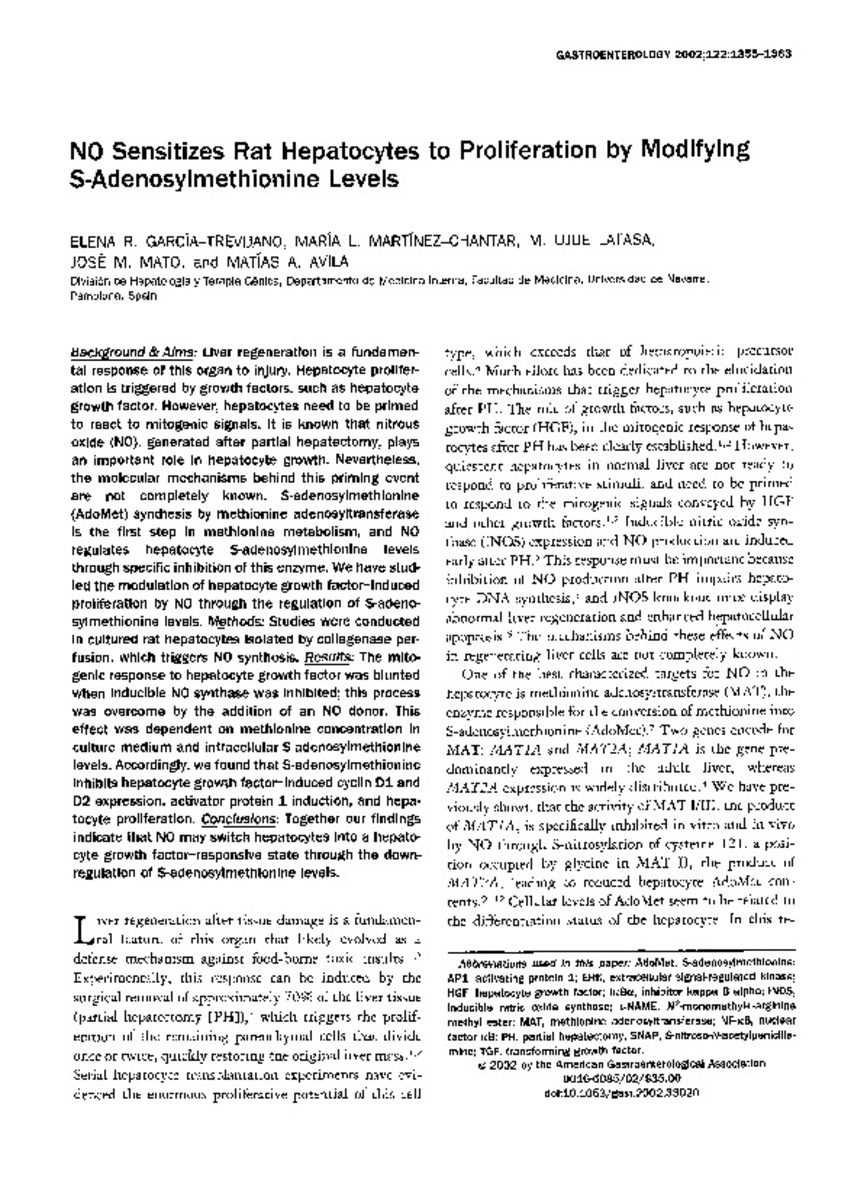Registro completo de metadatos
| Campo DC | Valor | Lengua/Idioma |
|---|---|---|
| dc.creator | Ruiz Garcia-Trevijano, E. (Elena) | - |
| dc.creator | Martinez-Chantar, M.L. (María Luz) | - |
| dc.creator | Latasa, M.U. (María Ujué) | - |
| dc.creator | Mato, J.M. (José María) | - |
| dc.creator | Avila, M.A. (Matías Antonio) | - |
| dc.date.accessioned | 2012-10-02T16:01:31Z | - |
| dc.date.available | 2012-10-02T16:01:31Z | - |
| dc.date.issued | 2002 | - |
| dc.identifier.citation | Garcia-Trevijano ER, Martinez-Chantar ML, Latasa MU, Mato JM, Avila MA. NO sensitizes rat hepatocytes to proliferation by modifying S-adenosylmethionine levels. Gastroenterology 2002 May;122(5):1355-1363. | es_ES |
| dc.identifier.issn | 1528-0012 | - |
| dc.identifier.uri | https://hdl.handle.net/10171/23275 | - |
| dc.description.abstract | BACKGROUND & AIMS: Liver regeneration is a fundamental response of this organ to injury. Hepatocyte proliferation is triggered by growth factors, such as hepatocyte growth factor. However, hepatocytes need to be primed to react to mitogenic signals. It is known that nitrous oxide (NO), generated after partial hepatectomy, plays an important role in hepatocyte growth. Nevertheless, the molecular mechanisms behind this priming event are not completely known. S-adenosylmethionine (AdoMet) synthesis by methionine adenosyltransferase is the first step in methionine metabolism, and NO regulates hepatocyte S-adenosylmethionine levels through specific inhibition of this enzyme. We have studied the modulation of hepatocyte growth factor-induced proliferation by NO through the regulation of S-adenosylmethionine levels. METHODS: Studies were conducted in cultured rat hepatocytes isolated by collagenase perfusion, which triggers NO synthesis. RESULTS: The mitogenic response to hepatocyte growth factor was blunted when inducible NO synthase was inhibited; this process was overcome by the addition of an NO donor. This effect was dependent on methionine concentration in culture medium and intracellular S-adenosylmethionine levels. Accordingly, we found that S-adenosylmethionine inhibits hepatocyte growth factor-induced cyclin D1 and D2 expression, activator protein 1 induction, and hepatocyte proliferation. CONCLUSIONS: Together our findings indicate that NO may switch hepatocytes into a hepatocyte growth factor-responsive state through the down-regulation of S-adenosylmethionine levels. | es_ES |
| dc.language.iso | eng | es_ES |
| dc.publisher | WB Saunders | es_ES |
| dc.rights | info:eu-repo/semantics/openAccess | es_ES |
| dc.subject | Hepatocytes/physiology | es_ES |
| dc.subject | Nitric Oxide/physiology | es_ES |
| dc.subject | S-Adenosylmethionine/analysis | es_ES |
| dc.title | NO sensitizes rat hepatocytes to proliferation by modifying S-adenosylmethionine levels | es_ES |
| dc.type | info:eu-repo/semantics/article | es_ES |
| dc.relation.publisherversion | http://www.sciencedirect.com/science/article/pii/S0016508502513482 | es_ES |
| dc.type.driver | info:eu-repo/semantics/article | es_ES |
Ficheros en este ítem:
Estadísticas e impacto
Los ítems de Dadun están protegidos por copyright, con todos los derechos reservados, a menos que se indique lo contrario.






